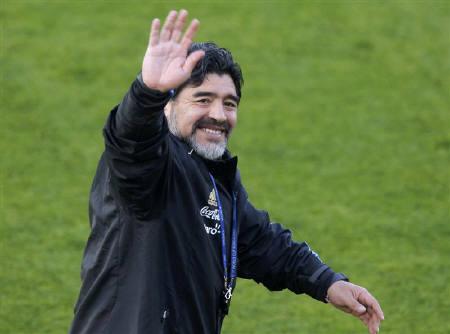AFP: Argentine football great Diego Maradona underwent successful brain surgery for a blood clot in a specialist private clinic in Buenos Aires on Tuesday, his doctor said.
“We managed to successfully remove the clot. Diego coped well with the surgery,” Leopoldo Luque said at the icon’s private clinic in the capital Buenos Aires.
“It’s under control, there’s a little drainage [of blood]. He’ll remain under observation.”
Maradona had a subdural hematoma, which is an accumulation of blood between a membrane and his brain, said Luque. He described the procedure as “routine surgery”.
He said the problem likely was caused by an accident, but Maradona said he doesn’t remember the event. Luque said the clot was “imperceptible” and that those suffering from one rarely remembered receiving a knock to the head.
Maradona, who turned 60 on Friday, has suffered ill health before. He has survived two heart attacks, and also contracted hepatitis and undergone gastric bypass surgery.
Groups of fans congregated outside the clinic with banners showing Maradona’s face and the words “Come on, Diego!”
“I came with my wife to support the greatest player of all time,” fan Oscar Medina told AFP news agency.
“Once more his health has played a trick on him but he has antibodies to recover with the help of the people,” added Medina.
“I feel very sad and impotent but we’re going to stay by his side until the last day,” said another fan, Matias Di Sciosio.
The 1986 World Cup champion was transported to Olivos Clinic in La Plata, south of Buenos Aires. Since the surgery was successful, Maradona could go home after 48 hours, his doctor said.
‘Many pressures’
Maradona was transferred from the hospital in La Plata, 60 kilometers (37 miles) south of Buenos Aires, to the capital at 6:00 pm (2100 GMT) accompanied by one of his daughters, Giannina.
Dozens of Gimnasia fans outside the La Plata hospital chanted his name as he left.
Earlier in the day, Luque claimed Maradona was feeling “much better and eager to leave” hospital but insisted that the Gimnasia Y Esgrima coach was suffering from anemia – a lack of iron in his system – and dehydration.
Luque said it has left him feeling “very weak, very tired.” After further tests, he was diagnosed with the blood clot.
He also suggested Maradona’s lifestyle had contributed to his condition.
“He’s an elderly patient with many pressures in his life. It’s a time when we must help him. It’s very difficult to be Maradona,” Luque said of the star.
He said it was a condition that also affected current Vice-President Cristina Kirchner when she was president.
The doctor ruled out any link to the coronavirus pandemic, which is ravaging the South American country, much of it still under confinement.
Maradona is considered at high risk of coronavirus complications should he be infected.
Last week, he began self-isolation for the second time after a bodyguard displayed coronavirus symptoms, though he later tested negative.
He joined his players briefly at the club’s training ground on his birthday, but had obvious difficulty walking and had to be helped away by his assistants after staying only 30 minutes.
“It breaks my heart to see him like this,” Giannina tweeted the next day.
The footballer, who won the World Cup with Argentina in 1986 and is widely considered to be one of the greatest players of all time, alongside Brazil’s Pele, who turned 80 last month.
Maradona has continued to cause controversy since his heyday as a player, getting sent home from the 1994 World Cup in the United States for doping and dropping in and out of the game as a coach.
He last appeared in public on his 60th birthday on Friday before his side’s league match against Patronato.
Dozens of fans of Gimnasia y Esgrima had converged on the hospital, waving flags and holding posters with messages of support as they waited for news of Maradona’s health.
“What we want the most is for Diego to get out of all this. He can, he is the greatest, the greatest in the world,” said Diego Bermudez, 41, a Maradona fan waiting outside the hospital.
‘He needs support’
Maradona has difficulty retaining iron because of gastric bypass surgery he underwent in 2005 to lose 50kg (110 pounds), leaving him prone to anemia, Luque said.
Though he has recovered from a well-documented addiction to hard drugs, Maradona takes medication in the form of tranquilizers and anxiolytics.
Luque said Maradona, whose “Hand of God” goal against England is among the most controversial in World Cup history, felt sad for about a week and refused to eat before arriving at the clinic.
